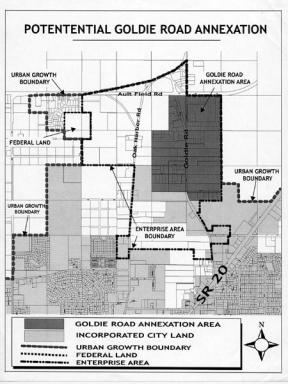Gov. Gary Locke is expected to sign a bill into law today that will reinstate a petition method for annexation, giving municipalities across the state a new option for expanding their boundaries.
That’s good news for Oak Harbor city council members and others who have been pushing to annex the 180-acre Goldie Road area north of the city. The largely commercial and industrial area would potentially bring thousands of dollars of tax revenue into the city each year.
“It’s about expanding or increasing our economic development opportunities,” said Steve Powers, city development services director.
But even with the new law, at least half of registered voters and those who own a majority of the acreage in the proposed area would have to agree to an annexation. Powers said the city is still in the process of educating folks in the area and trying to gauge support. He said there’s a lot of misunderstanding and misinformation out there — annexing, contrary to popular belief, won’t change zoning, development standards or sales taxes.
There’s also skepticism to deal with. John Klein, owner of Oak Harbor Pet Salon, said he and many others moved their businesses out of the city to Goldie Road in order to escape “an environment that doesn’t seem conducive to business.” He suggested city officials concentrate on revitalizing what they already have, especially the downtown area.
“Annexing out here,” he said, “is running away from the core of the problem.”
Meanwhile, the state Supreme Court is still in the process of reconsidering a controversial decision a year ago that struck down the petition method. The high court ruled the method unconstitutional because it “offered privilege to a favored minority.” It allowed annexation if owners of 60 percent of the assessed value of a piece of land signed on.
The ruling was a major problem for cities across the state. The petition method was by far the most common way cities expanded boundaries. Dave Catterson, a municipal government analyst with the Association of Washington Cities, said cities were left with only the cumbersome election method.
Under this system, only the registered voters within a defined boundary would cast ballots for an annexation. Catterson said this sets up “absurd situations” in which a handful of residents — who may simply be renters — would decide the fate of large tracts of land.
Oak Harbor officials, in fact, had started exploring the election method to annex the Goldie Road area. Officials held two town hall meetings last month for residents and landowners in the area. Six of the dozen registered voters in the area showed up for the first meeting. About a dozen of the 60 to 80 property owners attended the second meeting.
But Catterson said the new annexation law, which the AWC lobbied hard for, should help cities by restoring another option of annexation. He said the bill was written in order to avoid constitutional problems and also to stand even if the Supreme Court reversed itself on the old method.
Under the new law, the owners of more than half of the acreage in the proposed area and a majority of the registered voters have to sign the annexation petition. The city council would also have to agree to the annexation.
For now, Powers said the city needs to evaluate which process would work best. He said the city is also considering doing a formal survey of Goldie Road landowners and registered voters.
There are definite pros and cons to annexation for everyone involved.
According to a city pamphlet handed out at the meetings, annexation would mean quicker response time for law enforcement, no change in sales tax, a 50 percent reduction in water rates, the ability to hook into the city’s sewer system — which is a major concern or some — and little change in zoning or development standards.
Powers said most people in the area are unaware of the interlocal agreement between the city and county under which current zoning is almost identical to future city zoning (after annexation.) Also, there’s an existing set of “blended development standards” for the unique area, which combine city and county regulations.
On the other hand, landowners will have to pay higher property taxes if annexation occurs. The city’s current tax levy rate is about $10.86 per $1,000 of assessed value while the county is about $9.24 per $1,000.
Businesses wouldn’t be required to hook into the city’s sewer system, but owners would have to pay the cost of connection.
There’s also a question of pre-annexation agreements. Many of the businesses in the Goldie Road area signed pre-annexation agreements when hooking into the city’s water system. The agreements basically say that the businesses will support future annexation of the area.
Catterson said he believes that pre-annexation agreements remain in effect under the new law. Yet the majority of city officials, however, have said they don’t want to force annexation down the throats of business.
“We need to get a better handle of what support there is,” Powers said, “and then we’ll report back to council for direction.”
You can reach News-Times reporter Jessie Stensland at jstens
land@whidbeynewstimes.com or call 675-6611.



